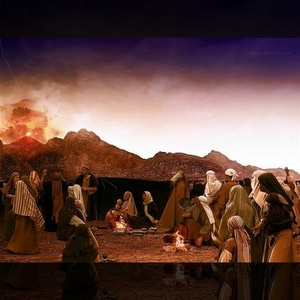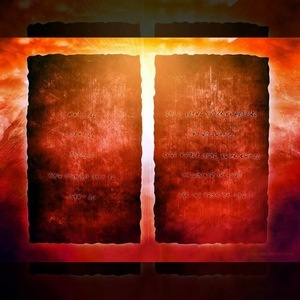| << Previous (Beshalach) | Next (Mishpatim) >> |
The Hebrew Word
Yitro is the Hebrew name of Moses' father-in-law. Yitro means "his abundance." Yitro is also known as Hovav, and Hovav means "cherished, favored, and beloved." Yitro [Strong's #3503] is used 11 times in 9 verses in the Tanakh. Every instance refers to the man called "Jethro" in English.
First use in Scripture
The first time Yitro is used in Scripture is in Exodus 3.
Now Moses was pasturing the flock of Yitro his father-in-law, the priest of Midian; and he led the flock to the west side of the wilderness and came to Horeb, the mountain of G-d. (Exodus 3:1)
Last use in Scripture
The last time Yitro is used in Scripture is in Exodus 18.
Then Yitro, Moses' father-in-law, took a burnt offering and sacrifices for God, and Aaron came with all the elders of Israel to eat a meal with Moses' father-in-law before God. (Exodus 18:12)

Parashah Outline
- Yitro, Moses' Father-in-law - Exodus 18:1
- Yitro Counsels Moses - Exodus 18:17
- Moses on Sinai - Exodus 19:1
- Y-H-V-H visits Sinai - Exodus 19:18
- The Ten Commandments are Given - Exodus 20:1
Portraits of Messiah
Pending

Other Observations
The Anomaly of Chapter 18
As Parashah Yitro opens, we see a repetition of a specific phrase three times in the first 5 verses (Exodus 18:1-5): "Yitro... Moses' father-in-law".
Why the repetition?
It seems likely that anyone who has been reading the Torah up to this point would know who Yitro was. He was originally introduced back in Exodus 3:1 and mentioned again in Exodus 4:18, so why reiterate (three times no less!) that this is "Yitro... Moses' father-in-law"? It is enough to cause one to take a second look at this parashah... which may be part of the intent of the repetition.
Yitro
Given that Yitro is a (pagan) priest of Midian, it may be that Scripture wants to make it abundantly clear via repetition that Yitro has no blood-kin relations with Moses. He is an "in-law" and is not to be associated with the Levitical priesthood that G-d establishes throughout the events at Sinai.
Timing
As the previous chapter (Exodus 17) closes, we find the Israelites at Refidim after their successful battle against Amalek. In Chapter 18, we see Moses daily sitting with the Israelites, making known to them "the statutes of G-d and his laws" (Exodus 18:16). How can Moses relate the statutes of G-d and his laws when the Israelites have not yet arrived at Mt. Sinai and been given the commandments? That happens in chapter 20!
If we look at (Exodus 19) we find that it begins by recording the Israelites leaving Refidim, coming to Sinai, and camping there "in front of the mountain". Chapter 17 ends with the Israelites in Refidim and Chapter 19 begins with the Israelites leaving Refidim. It seems that Chapter 18 is out of chronological sequence with Chapters 17 and 19. This gives us additional reason to examine it more throughly than usual.
In Exodus 18:1, we again see Yitro described as "the priest of Midian". (See Yitro: A Commentary for a list of Yitro's names). Midian is not only the name of a geographic region it is also the name of a person. Midian is first mentioned in Genesis 25:2 as a son of Abraham through his wife, Keturah.
In a literal sense, the word yitro means "his excellency" and may be viewed as a title rather than a proper name. As such, we can read Moses' father-in-law being introduced as "His Excellency, the Priest of Midian".
Priest of Midian- the friend of G-d?
We first see the "priest of Midian" language in Exodus 2:16 when it describes the priest's seven daughters coming to water their flock. These are the same daughters Moses helps as he is fleeing from Egypt. In Exodus 2:18, we see these daughters going to Reu'el, their father, and relating the story of Moses' help. Reu'el means "friend of G-d". In verse 21, Reu'el gives his daughter Zipporah to Moses in marriage.
Tzipporah
We first see Zipporah in that verse (Exodus 2:21) and find her mentioned by name only 3 times in the whole of Scripture (including our "anomaly chapter"):
- Exodus 2:21- she is betrothed to Moshe
- Exodus 4:25- when she circumcises her son. This is presumably when Moshe sends her away (as noted in Exodus 18:2), as she is not mentioned again until chapter 18.
- Exodus 18:2- she is brought back to Moshe
Does this foreshadow the future of Israel? Possibly.
Zipporah's history in Scripture paints a similar picture of Israel:
- Jeremiah 31:32- she is betrothed to G-d (He was a "husband" to Israel) at Mt. Sinai
- Jeremiah 3:8- G-d sends her away
- Jeremiah 3:11-13- she is called to return to G-d
Additional insight may be found when examining Zipporah's name. The name Zipporah [Strong's #6855] comes from the Hebrew word, which means "bird" [Strong's #6833]. When considering "birds" in relation to a covenant, a few references come to mind:
Genesis 15:9-10 tells us that Abram brought the animals G-d commanded and made a covenant with Him. That list of animals included a turtledove and a young pigeon. Verse 10 notes that Abram did not cut the birds. As a picture of "the bride," this makes sense. We are to love G-d wholly (Deut 6:4) and not be of two parts (i.e. "double-minded" James 1:7-8).
In Matthew 13:31-32 the Master gives a parable telling the disciples that the kingdom of heaven is like a mustard seed that a man sowed in his field. The mustard seed, although small, grew into a great plant "and becomes a tree" so that the "birds of the air come and nest in its branches". This is a quote from Ezekiel 17:23 in which G-d plucks a tender twig from the top of a cedar tree and plants it in Israel, then the "birds of the air come and nest in its branches". The trees are a metaphor for peoples or nations. The birds could be understood to be pictures of individuals leaving their trees/nations to come and rest and build nests in the tree/nation of G-d's people, Israel.
Sons
Exodus 18 also tells of two sons between Moses and Zipporah :
- Gershom- meaning "foreigner there"
- Eliezer - meaning " G-d was my help"
Very little is mentioned of these sons. It is as if there is a desire for them not to be given much attention (as would likely be the case as Moses' heirs). The focus of Scripture here is Israel's betrothal to her "husband" (G-d) and the commandments that make up the betrothal covenant.
Commandments In the Parashah
Sixteen of the traditional 613 commandments are found in this parashah.
- 1- To know there is a G-d- Exodus 20:2
- 2- Do not entertain thoughts of other gods besides Him- Exodus 20:3
- 89- Do not make an idol for yourself- Exodus 20:4
- 87- Do not worship idols in the manner they are worshiped- Exodus 20:5
- 88- Do not worship idols in the four ways we worship G-d- Exodus 20:5
- 284- Do not take G-d's Name in vain- Exodus 20:7
- 162- To sanctify the day with Kiddush and Havdalah- Exodus 20:8
- 159- Do not do prohibited labor on the seventh day- Exodus 20:10
- 223- Respect your father or mother- Exodus 20:12
- 498- Do not kidnap- Exodus 20:15
- 504- Do not murder- Exodus 20:13
- 558- Do not testify falsely- Exodus 20:16
- 501- Do not covet and scheme to acquire another's possession- Exodus 20:17
- 91- Do not make human forms even for decorative purposes- Exodus 20:23
- 12- Do not build the altar with stones hewn by metal- Exodus 20:25
- 13- Do not climb steps to the altar- Exodus 20:26
Related Verses In the Torah
Exodus 18:1 - Exodus 2:16,18;3:1- other references to Yitro
Exodus 18:2 - Exodus 2:21; 4:25- other references to Zipporah
Exodus 18:3 - Exodus 2:22; 4:20- references to Moses' sons
Exodus 18:4 - Genesis 49:25 - Jacob relates the blessings to Joseph, including the blessings of heaven above and the "deep that lies beneath," prophesying the Yom Suf crossing.
Exodus 18:5 - Exodus 3:1, 12; 4:27; 24:13- other references to the "Mountain of G-d"
Exodus 18:7 Another instance of individuals greeting each other and asking "mah shalomkha?" [how is your peace?]- Genesis 29:13; Exodus 4:27
Exodus 18:7 References to welfare- Genesis 43:27
Exodus 18:7 References to the Exodus- Exodus 4:23; 7:4, 5
Exodus 18:8 References to G-d's holiness- Exodus 15:11
Exodus 18:12 References to a sacrificial meal- Genesis 31:54; Exodus 24:5
Exodus 18:15 - Numbers 27:5; Deuteronomy 17:8-13
Exodus 18:18 - Numbers 11:14, 17; Deuteronomy 1:12
Exodus 18:18 Help from Yitro- Deuteronomy 1:9
Exodus 18:19 Help from Yitro- Numbers 27:5
Exodus 18:20 References to G-d's teaching Israel- Deuteronomy 1:18; 4:1, 5; 5:1
Exodus 18:21 References to appointing judges- Exodus 18:25; Deuteronomy 1:13, 15
Exodus 18:21 What a judge should act like- Deuteronomy 16:19
Exodus 18:22 References for what the judges would do Deuteronomy 1:17
Exodus 18:22 No burden- Num 11:17
Exodus 18:25 References to judges- Ex 18:21; Deut 1:15
Related Verses In the Prophets
Exodus 18:7 Reference to welfare- 2 Samuel 11:7
Exodus 18:9 Events of the crossing of the Yom Suf recounted in Isaiah- Isaiah 63:7-14
Related Verses In the Writings
Exodus 18:4 Description of Moses' sons- 1 Chronicles 23:15,17
Exodus 18:11 References to G-d's Holiness- Ps 95:3; 97:9; 135:5
Exodus 18:20 Teaching- Ps 143:8
Exodus 18:21 References to appointing judges- 2 Chr 19:5-10
Related Verses In the Apostolic Writings
Exodus 18:3 Quote of the Torah regarding Moses fleeing and becoming an alien in the land of Midyan- Acts 7:29
Exodus 18:11 References to G-d's "mighty deeds with his arm" referring to the Exodus- Luke 1:51
Appendix
Nine verses that include Yitro (Strong's #3503)
Exodus 3:1
Exodus 4:18
Exodos 18:1, 2, 5, 6, 9, 10, 12
